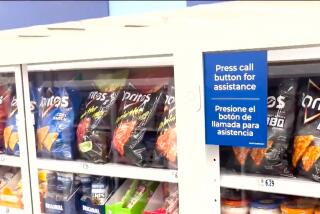The S&L; Bailout Agency Gets Into Retailing--and Business Is Great
- Share via
Already the largest financial institution in the country, the Resolution Trust Corp. entered a new line of business late last year: retail sales.
That’s when the government agency, which was created to manage and sell failed thrifts, opened up “The RTC Store” in Simi Valley, to sell furniture, office equipment and decorative art from former branches of defunct Gibraltar Savings in California.
At first, officials had hoped to sell about $200,000 worth of the stuff out of a storefront and warehouse in an inconspicuous business park. But after a little more than three months in operation, sales have topped $500,000. The store has also been able to charge prices of 30% to 50% more than the RTC’s original sober appraisals on the goods--and much more than the RTC could get for them at auction.
In fact, the store has “surpassed everyone’s wildest expectations,” said John Shumate, one of the agency officials who came up with the idea. Now, officials liquidating Lincoln Savings and Santa Barbara Savings plan to give the “RTC Store” idea a try in order to trim the government’s tab for closing S&Ls.;
The RTC plans to close the Simi Valley store this week and hold an auction, perhaps in May, to sell off the remaining items. But as of late last week, the store still had plenty of leftovers to sell.
Various wooden desk and computer stand combinations were marked to sell for between $275 and $325. More than 50 different framed lithographs and other artworks could be had for $50 to $75.
Shelves were packed with office equipment: more than 150 electric typewriters, selling for $75 to $250, more than 200 10-key calculators at $35 each, several dozen microfiche readers at $40 each. There were also assorted currency counters ($150), check-signers ($650) and time clocks ($50).
Finally, for those searching for an appropriate memento of the S&L; business’s high-flying days, there were only a few paper shredders left, at $200 to $300 each.
Gibraltar was once the 10th-largest S&L; in the country, with $15 billion in assets. But suffering from heavy losses in its portfolio of commercial real estate loans, the S&L; was seized by the government in March, 1989, in the middle of a rush on deposits by Gibraltar customers. Security Pacific Corp. agreed to buy most of Gibraltar’s branch network in June, 1990. Shortly afterward, the RTC announced that the thrift’s bailout would cost the government $628 million.
More recently, regulators have claimed that Gibraltar was one of the S&Ls; that was “plundered” by Drexel Burnham Lambert, the investment banking firm that was the most prominent seller of junk bonds. The government claimed in a lawsuit filed last November that the entire junk bond market was a sham propped up, in part, by the sale of risky, high-yield bonds to S&Ls; such as Gibraltar.
When it took over Gibraltar, the government inherited some tough-to-sell assets, including the Los Angeles Equestrian Center, a 72-acre facility in Griffith Park, which the thrift acquired through foreclosure in 1988. The RTC finally sold the equestrian center to a Burbank development firm more than a year ago.
The RTC ended up having to sell the furniture and equipment from about 40 California branches of Gibraltar after Security Pacific decided last fall that it did not want the locations. By early last November, about 30 large moving vans had brought the contents of the branches to Simi Valley, where the S&L; was headquartered, and piled it up in the warehouse.
Shumate and his boss, Ted Sprink, manager of the strategic planning office for the RTC’s Pacific Coast region, came up with the retail idea as they began planning to auction off the goods.
The typical way to sell off office equipment is by auction, but Shumate and Sprink figured that could take as much as three months to plan; in the meantime, the goods would be sitting in a warehouse. In addition, Shumate and Sprink believed that they could charge more for their goods in a retail store than bargain hunters would pay at an auction.
At first, the RTC opened the store by appointment only to large corporate buyers. Next, it invited smaller companies, especially local banks and thrifts, to look over the furniture and office equipment. In all, Shumate said the RTC sent out invitations to 1,500 different area business.
About five weeks ago, the RTC opened up the store to ordinary consumers (although Gibraltar and RTC employees are excluded). The agency ran ads in newspapers proclaiming “Everything must go!” The latest group of buyers the store has targeted is used furniture dealers.
The store “brought some private sector thinking into a bureaucratic process,” Shumate said. When desk sets that the store was offering as “secretarial” desks weren’t moving well, the store dubbed the furniture “executive workstations,” and customers suddenly got interested.
But other entrepreneurial ideas did not work out as well. Store employees believed that a set of chairs from one Gibraltar branch had an upholstery pattern that seemed vaguely Mexican. “We contacted every Mexican restaurant in the San Fernando Valley,” said Shumate, but they found no buyers.
More to Read
Inside the business of entertainment
The Wide Shot brings you news, analysis and insights on everything from streaming wars to production — and what it all means for the future.
You may occasionally receive promotional content from the Los Angeles Times.










